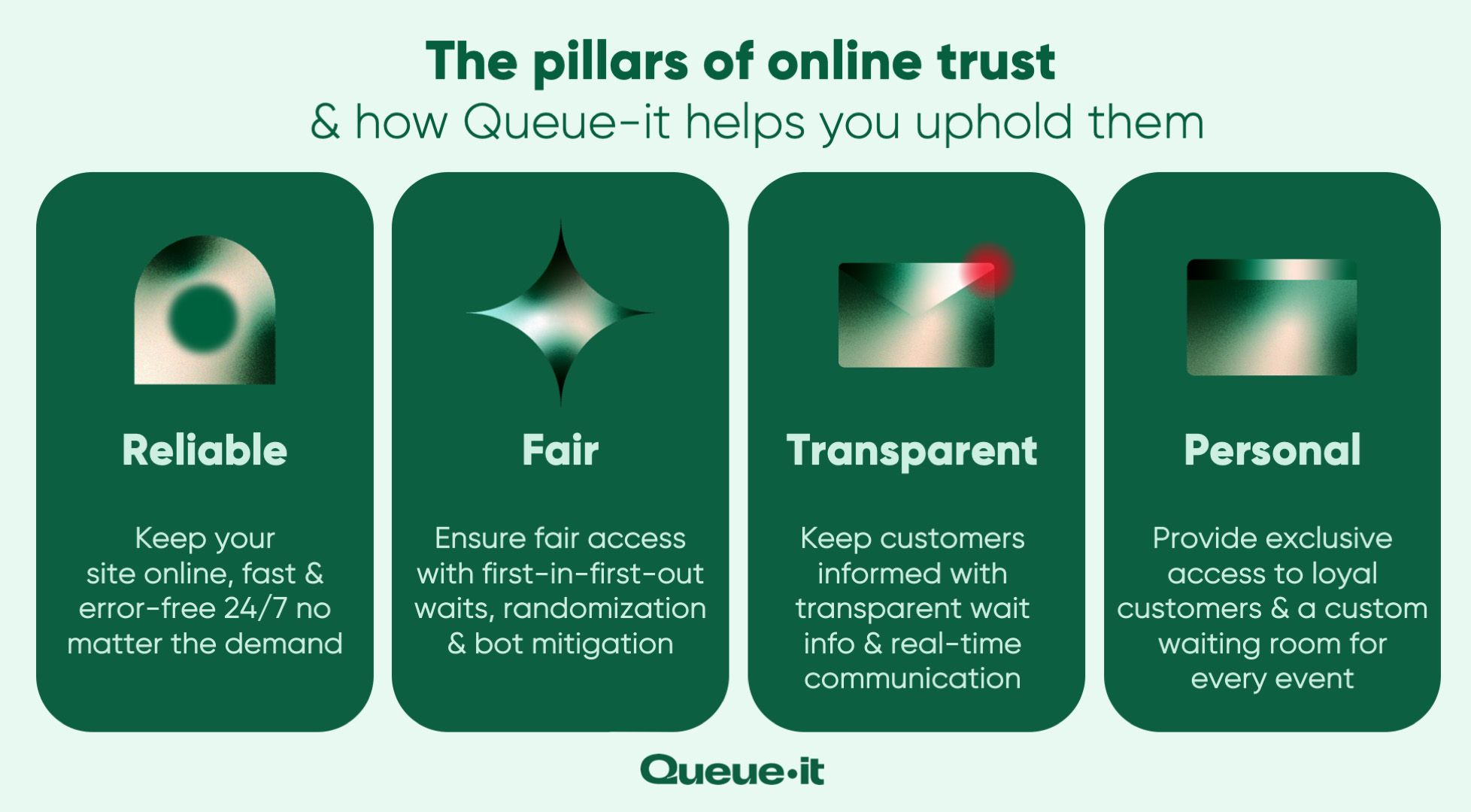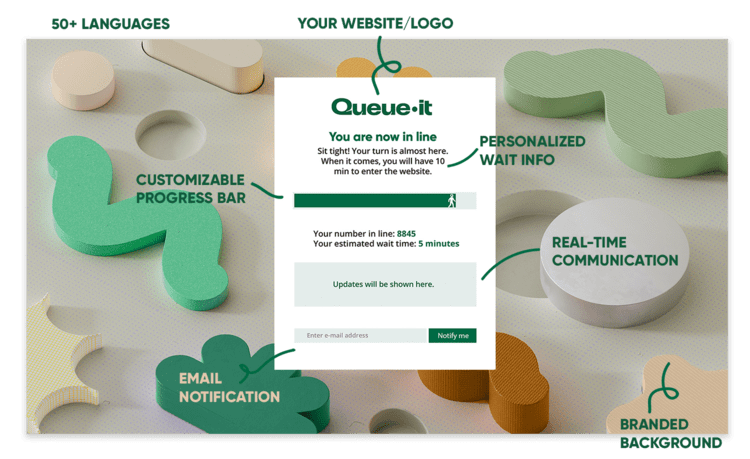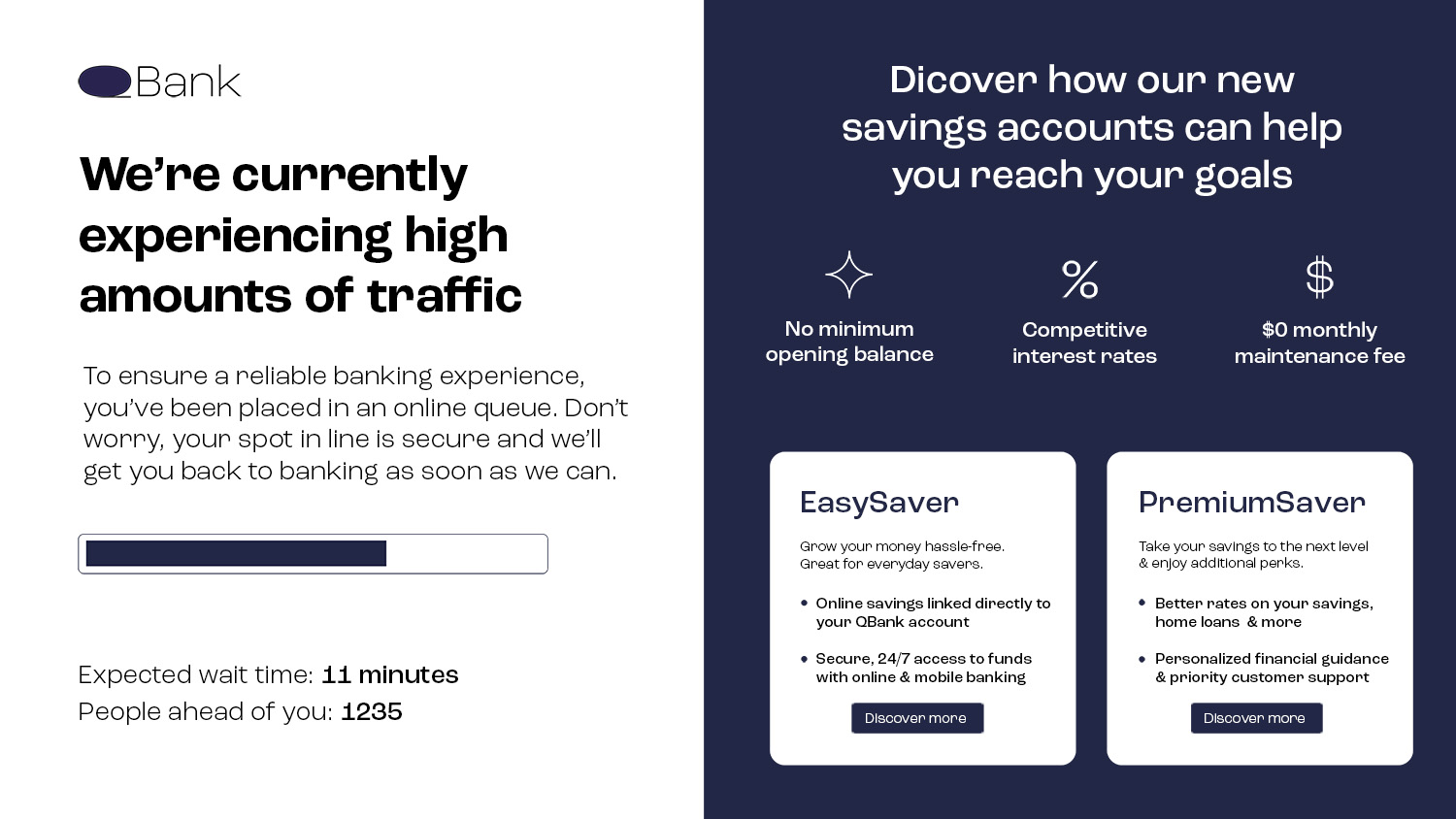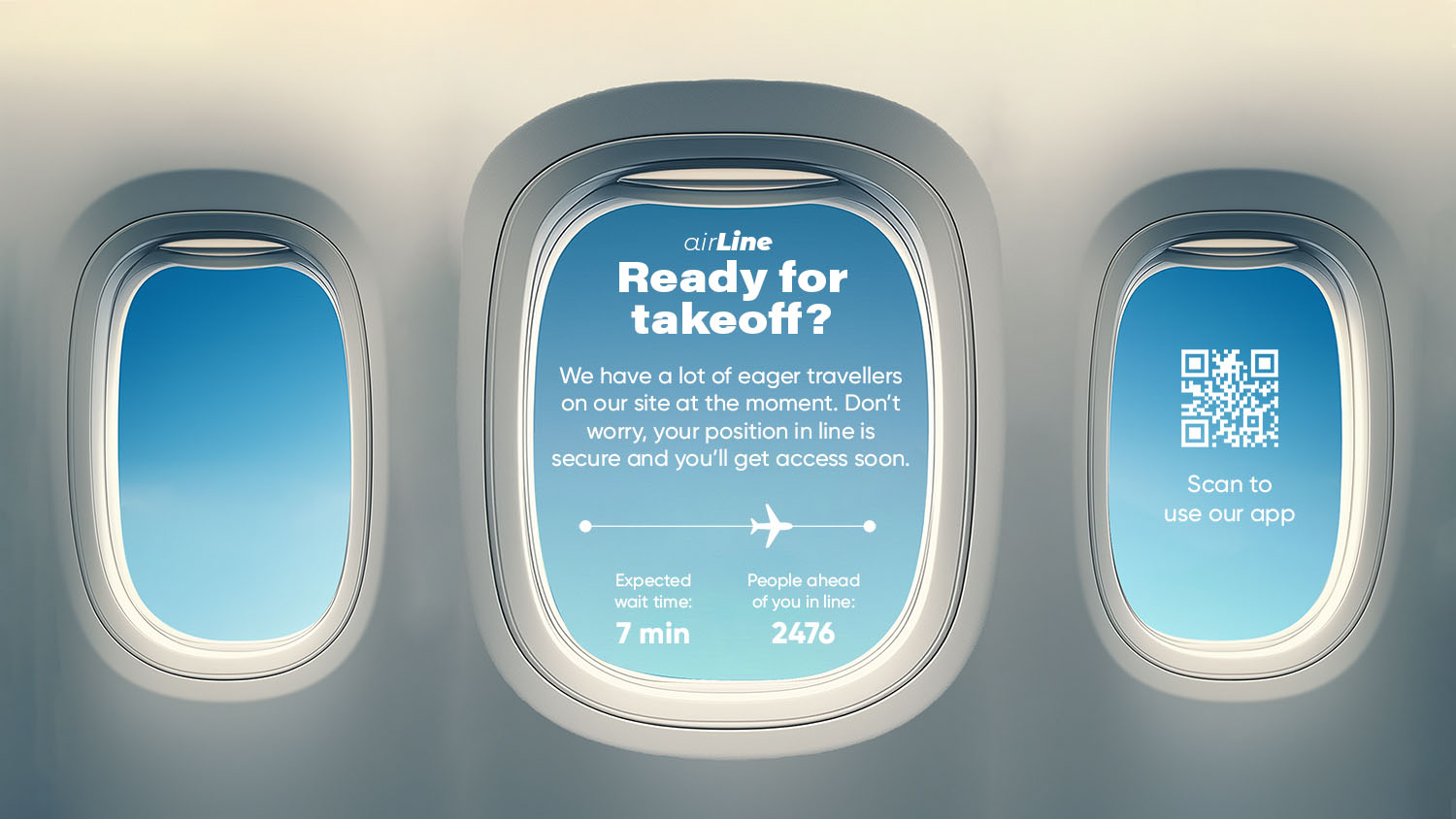How Queue-it helps build online trust, one high-traffic event at a time

Every purchase or registration is an act of trust. Your brand reputation, customer loyalty, and organization’s value—they’re all dependent on trust. But in the online world, trust is fragile. It’s hard to win and easy to lose. Find out how Queue-it helps you nurture and build trust by empowering you to deliver reliable, fair, transparent, and personalized online experiences, no matter the demand.
Trust has always been an essential ingredient of success—in business, governments, and partnerships.
Winning the trust of your customers makes them more likely to shop with you, to support and recommend you, and to embrace change and transformation.
- Trusted companies outperform their peers by up to 400%
- Customers who trust a brand are 88% more likely to buy again
- 84% of customers who highly trust a brand have stayed loyal to them for over a year
But trust is a fragile thing. And in the online world, it’s tough to win and easy to lose.
The fight for customer attention and loyalty is fierce. Our digital experience is shaped by an unending stream of notifications, advertisements, sale offers, influencers, and AI-generated content. The digital noise is deafening.
Meanwhile, consumers’ expectations for digital experiences are constantly reaching new heights. They've been around the block, know what a good online experience looks like, and won't waste time with a brand or service that doesn't deliver.
- 65% of consumers say they trust a business less after experiencing one website problem
- 1 in 3 customers will abandon a brand they love after just one bad experience
So, when you’ve managed to cut through the noise and capture customers’ attention, it’s more crucial than ever to capitalize on the business opportunity of peak traffic.
But without control over site traffic, your big brand moment can easily turn into a chaotic free-for-all—shaped by site crashes, slowdowns, errors, and bots.
That’s why at Queue-it, our mission is to empower businesses to deliver consistently trust-building digital experiences. We focus on this through four key pillars: fairness, reliability, transparency, and personalization.

Why it matters: Reliability is key to trust in any relationship—be it with a brand, a partner, or a government. Being reliable means customers can count on you to deliver consistently, to meet or exceed expectations, to follow through on your promises.
When an organization shows high levels of reliability, customers are 3.8x more likely to spend more with the brand (compared to a similar product or service).
Why it's hard to deliver: But in the online world, reliability is tough to maintain—especially at scale. The cruel irony of the internet is it’s when you’re at your most visible, during your biggest sales opportunities or most publicized registrations, that you’re most likely to fail the test of reliability.
Load-induced site crashes, slowdowns, and errors affect everyone from small businesses to governments to retail giants. There is no “too big to fail” in the world of websites. Amazon, Apple, Facebook, the IRS, Google—they’ve all been taken offline by surging demand.
How we help: Queue-it’s virtual waiting room empowers you to deliver reliable site performance no matter the demand. By giving you control over the flow of traffic, it lets you prevent website crashes, slowdowns, and errors like overselling or payment failure. It helps you build trust by creating consistent online experiences your customers can count on.
RELATED: The Comprehensive Guide to Virtual Waiting Rooms: All Your Questions Answered
“Now, when our customers access our launches, they can trust us to handle the traffic. They can trust our site to be fast. They can trust our launches to be fair. Queue-it creates an overall professional experience that works exactly as advertised.”
Chris Pirrotta, VP of Digital experience

Why it matters: Fairness is a signal of integrity. It means treating customers equally and looking out for their best interests. Prioritizing fairness shows customers you understand and care about them—and from that care, trust grows.
Fairness explains 80% of the variance in trust in online retailers, making it one of the top predictors of trust in ecommerce.
RELATED: Customer Loyalty in Ecommerce: The Surprising Benefits of Fairness
Why it's hard to deliver: The physical world comes with well-established rules and norms that define fairness and keep people in line with that definition. But online, these rules are undermined by a lack of traffic control and the anonymity of the internet.
When you have 10,000 people who want a product and only 500 units of inventory, how do you allocate the product in a fair and orderly way? How do you avoid a chaotic free-for-all that leaves genuine customers empty-handed?
This challenge is tough enough to solve digitally. But it’s becoming even tougher with the growing presence of bots and resellers, who exploit uncontrolled sales scenarios and your customers’ loyalty for profit.
How we help: Queue-it helps you build trust by giving you the control you need to ensure fair site access in every scenario.
The virtual waiting room allows you to flow customers to your site in secure, first-in-first-out (FIFO) order during unexpected traffic spikes. For scheduled events, it uses a combination of randomization and FIFO to ensure everyone who shows up on time gets an equal shot at access and remove the speed advantages of bots.
Plus, with our suite of bot mitigation tools, you can block bad actors altogether to ensure products go to genuine customers.
Queue-it brings the fairness of the physical world to your digital sales or registrations. It ensures no one can cut in line, no one can game the system, and that all visitors get an equal shot at the product or service they want.
“We wanted students to have a smooth and fair experience. Even if their course selections didn’t pan out to be exactly what they’d wanted, they’d know that the system was something they could understand, was transparent, and was as fair as possible.”
Cheryl Edwardes, Head of Business Change Management

Why it matters: Transparency is about open, honest communication with customers that gives them the information they need to make decisions with confidence. Like fairness, it’s a signal of integrity and respect. With transparency, you show you trust customers. And in turn, they’ll trust you back.
When customers consider a brand transparent, they’re 1.6x more likely to promote the brand on social media. 73% are willing to pay extra for products from brands they believe are transparent.
Why it's hard to deliver: High online demand threatens transparency just as it does reliability and fairness. If you’re facing site problems, selling out of certain products, or using a rudimentary queuing solution, customers can quickly get confused and frustrated.
You leave them with unanswered questions like “How long will I need to wait?”, “When will the site come back online?”, “Is everyone having these problems or is it just me?”, “Do I even have a chance of getting this product?”.
Queue psychology research shows that uncertainty, a lack of explanation, and anxiety fuels waiting experiences that actually feel longer.
RELATED: The Psychology of Queuing Revealed in 6 Simple Rules
How we help: The first step to reducing anxiety and frustration during high demand is to simply keep your site online and running smoothly—which, as we’ve covered, Queue-it helps you achieve.
But Queue-it is also built with queue psychology and transparency at its core, offering various features that empower organizations to give customers the information they need to stay informed and relaxed while they wait. These include:
- Detailed wait information like position in queue, estimated wait time, and visualized progress
- A real-time communication pane you can use to broadcast live messages to all customers, providing sales updates and key info
- Fully customizable waiting room design, allowing you to tailor your queue to give customers all the information they need or add helpful components like live inventory updates or customer support links

“Theatre show fans tweeted about how much the ticket sales process improved compared to the last time. We also saw many comments about how the queue enabled a reassuring, informed, and comfortable experience.”
Hiroaki Hasegawa, Director of System Development Department

Why it matters: Personalization builds trust through showing familiarity and humanity. It makes customers feel seen and understood. In the physical world, personalization typically comes from the staff delivering the service experience—greeting customers with a smile, asking and answering questions, sharing recommendations and opinions. Personalization creates the human touch that makes a service experience memorable and worth coming back for.
71% of consumers expect companies to deliver personalized interactions, and companies that do see a 10-15% lift in revenue.
Why it's hard to deliver: It’s easy for online customers to feel like just another number in the system, interacting with digital networks of information that they don’t understand and that don’t understand them. It’s hard to get answers to questions, a tailored experience, or rewarded or noticed for your loyalty.
How we help: Queue-it doesn’t solve this problem entirely—no company does—but we’ve made and are making efforts to enable businesses to provide more tailored online experiences that meet and exceed customer expectations. With Queue-it, you can:
- Provide exclusive access for loyal members, those who missed out in the past, or those who’ve purchased similar items
- Tailor your waiting room to every event with customized imagery, embedded content like videos or playlists, links to resources, exclusive promo codes, and much more
- Embed dynamic content like customer support chats, quizzes and polls, and mini games
RELATED: 11 Ways to Customize Your Waiting Room For a Better User Experience
With the growing importance of personalization, we’re also exploring new ways for organizations to curate and make the most of their waiting rooms. These include making it easier to add polls, quizzes, and games that not only keep customers engaged, but also allow you to tailor communications and collect valuable first-party data for personalization.
“Running the sale with Queue-it in place made sure we achieved our goal of delivering an enhanced experience for our loyal members. We gave them the priority access we had promised them as a cornerstone membership benefit.”
Tristan Watson, Engineering Manager

The trust customers have in your brand is critical to your success. But in the digital world, that trust is under constant threat.
High-demand sales and registrations are major trust-building or trust-breaking moments. They offer huge opportunities—sales, exposure, bringing in new customers.
But they also introduce large challenges which, if left unaddressed, break down customer trust and loyalty. Unreliable, unfair, misleading, and impersonal—these are words that can easily become associated with your brand if you fail to successfully control and manage your large events.
Queue-it empowers organizations to embrace the opportunities of high-demand sales and registrations without concern for the challenges they pose. The virtual waiting room lets you capitalize on peak traffic and build trust by ensuring reliable, fair, transparent, and personalized online experiences, no matter the demand.



